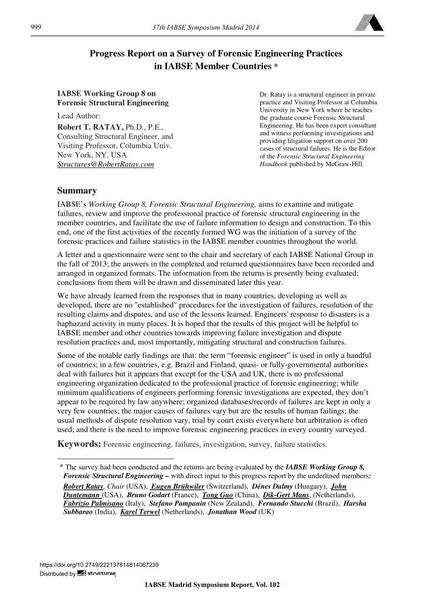Progress Report on a Survey of Forensic Engineering Practices in IABSE Member Countries *

|
|
|||||||||||
Bibliographic Details
| Author(s): |
IABSE WG on Forensic Structural Engineering
|
||||
|---|---|---|---|---|---|
| Medium: | conference paper | ||||
| Language(s): | English | ||||
| Conference: | IABSE Symposium: Engineering for Progress, Nature and People, Madrid, Spain, 3-5 September 2014 | ||||
| Published in: | IABSE Symposium Madrid 2014 | ||||
|
|||||
| Page(s): | 999-1002 | ||||
| Total no. of pages: | 4 | ||||
| Year: | 2014 | ||||
| DOI: | 10.2749/222137814814067239 | ||||
| Abstract: |
IABSE’sWorking Group 8, Forensic Structural Engineering,aims to examine and mitigate failures, review and improve the professional practice of forensic structural engineering in the member countries, and facilitate the use of failure information to design and construction. To this end, one of the first activities of the recently formed WG was the initiation of a survey of the forensic practices and failure statistics in the IABSE member countries throughout the world. A letter and a questionnaire were sent to the chair and secretary of each IABSE National Group in the fall of 2013; the answers in the completed and returned questionnaires have been recorded and arranged in organized formats. The information from the returns is presently being evaluated; conclusions from them will be drawn and disseminated later this year. We have already learned from the responses that in many countries, developing as well as developed, there are no "established" procedures for the investigation of failures, resolution of the resulting claims and disputes, and use of the lessons learned. Engineers' response to disasters is a haphazard activity in many places. It is hoped that the results of this project will be helpful to IABSE member and other countries towards improving failure investigation and dispute resolution practices and, most importantly, mitigating structural and construction failures. Some of the notable early findings are that: the term “forensic engineer” is used in only a handful of countries; in a few countries, e.g. Brazil and Finland, quasi- or fully-governmental authorities deal with failures but it appears that except for the USA and UK, there is no professional engineering organization dedicated to the professional practice of forensic engineering; while minimum qualifications of engineers performing forensic investigations are expected, they don’t appear to be required by law anywhere; organized databases/records of failures are kept in only a very few countries; the major causes of failures vary but are the results of human failings; the usual methods of dispute resolution vary, trial by court exists everywhere but arbitration is often used; and there is the need to improve forensic engineering practices in every country surveyed. |
||||
| Keywords: |
failures forensic engineering survey Investigation failure statistics
|
||||
